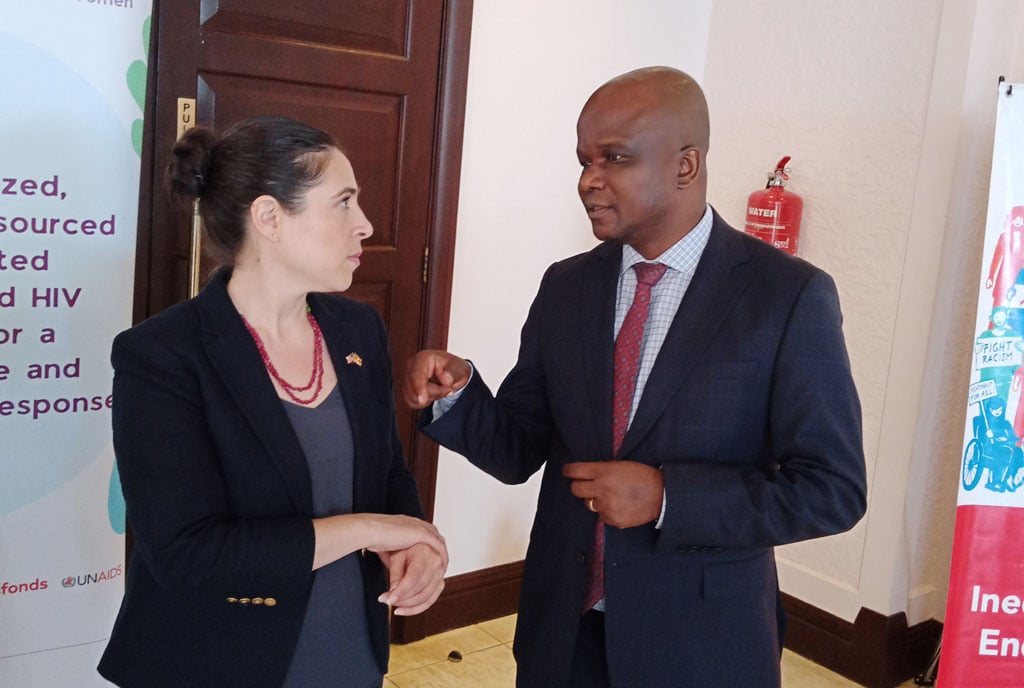Prime
Uganda to make HIV, Malaria test kits

The Health minister, Dr Jane Ruth Aceng, distributes HIV test kits to Ministry of Health and Kampala Capital City Authority health officials during the launch of the RDT kits and the mass HIV testing campaign in Kampala on October 12, 2023. PHOTO/ STEPHEN OTAGE
What you need to know:
- Dr Henry Mwebesa, the director general of health services, advised companies which have been importing the test kits, to start buying the locally manufactured kits because Uganda Virus Research Institute and the National Drug Authority have conducted studies on their efficacy and acceptability, which have yielded positive results.
- Mr Cedric Akwesigye, the CEO Microheam Scientifics and Medical Supplies, said they will be commissioning the company in Ntinda, a city suburb, on November 24.
Ministry of Health has revealed that the World Health Organisation and Uganda Virus Research Institute have given approval to Microheam Scientifics and Medical Supplies, a local factory, to start manufacturing HIV/Aids and Malaria Rapid Diagnostic Kits beginning next month.
While launching the Wondfo HIV/Aids self-testing kits in Kampala yesterday, the Health minister, Dr Jane Ruth Aceng, said the approval of local production of the kits is another remarkable achievement in the prevention and control of HIV/Aids. She added that it’s an additional tool to ensure routine testing and access to services, especially for those who have been lagging behind.
“Uganda has been working with partners to scale up HIV prevention and treatment through bio-medical interventions, the ABC strategy, ARV treatment services, and safe male circumcision,” Dr Aceng said.
She added: “The 2022 global update report shows that HIV-related new infections and death dropped to 54,000 and 17,000, respectively, which was a remarkable achievement and launching the kit means we shall now be offering high quality results.”
She further said the approval of the local manufacture of the test-kits is in line with the World Health Organisation and the African Union policy of promoting local manufacture of medical supplies within Africa, urging the company which will be manufacturing the kits to ensure that they have the required funding to meet the demand for the kits that will be consumed not only in Uganda but marketed to neighbouring countries as well.
Dr Henry Mwebesa, the director general of health services, advised companies which have been importing the test kits, to start buying the locally manufactured kits because Uganda Virus Research Institute and the National Drug Authority have conducted studies on their efficacy and acceptability, which have yielded positive results.
The guidelines for testing kits have also been drawn.
“All kits in the country should go through evaluation. We are working with the National Drug Authority to get rid of quack HIV kits which give false confidence. We want to go to the community and eliminate fake HIV kits. Why go for kits that are not validated in the country?” he said.
Mr Cedric Akwesigye, the CEO Microheam Scientifics and Medical Supplies, said they will be commissioning the company in Ntinda, a city suburb, on November 24.
He said the company, which is the World Health Organisation certified, will be able to produce 80 million test kits for HIV/Aids every year and another 50 million for Malaria to substitute the expensive imports that the country has been depending on.




